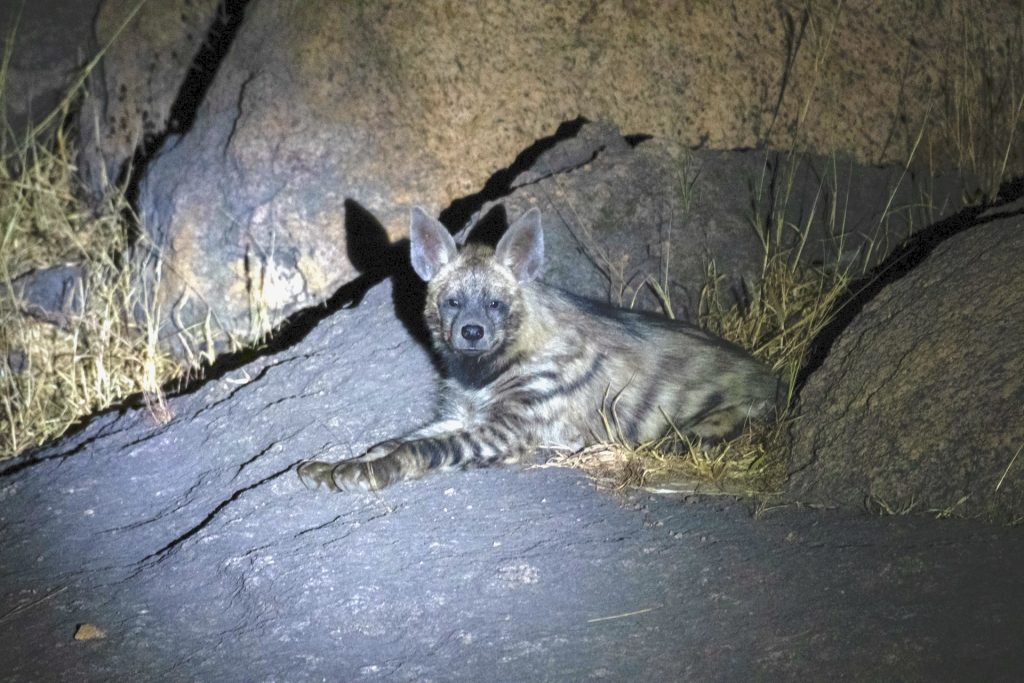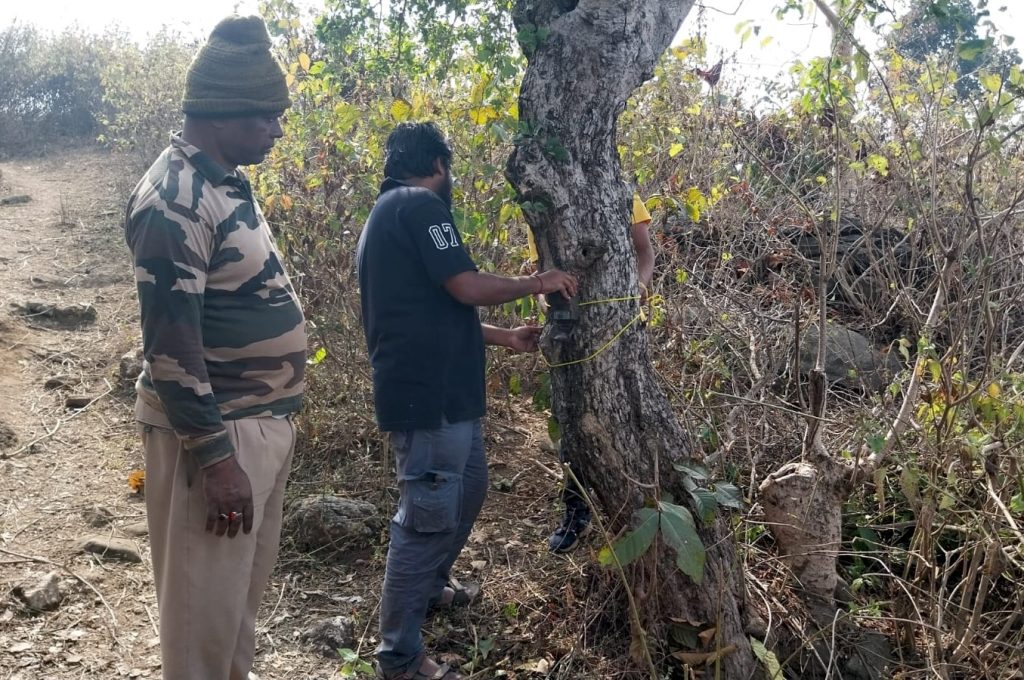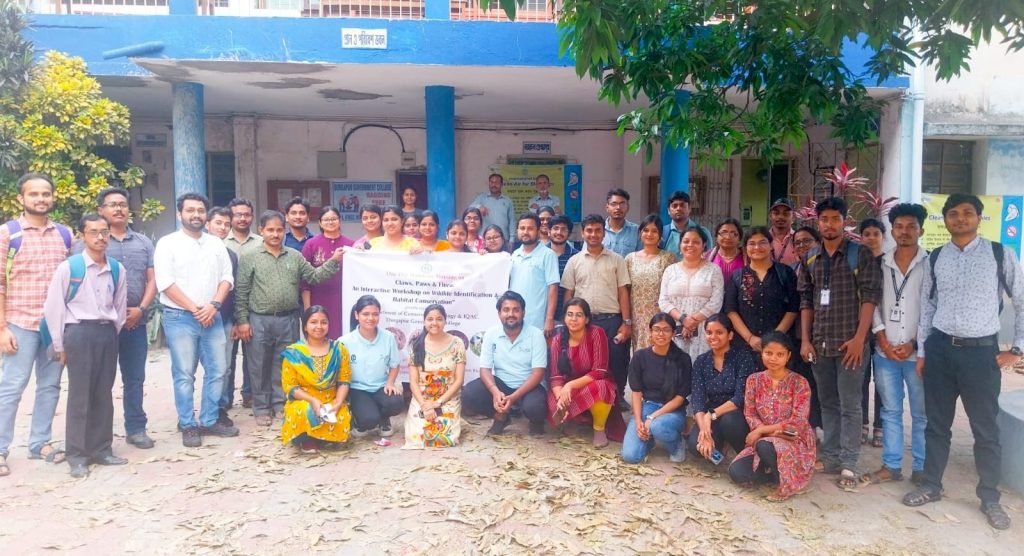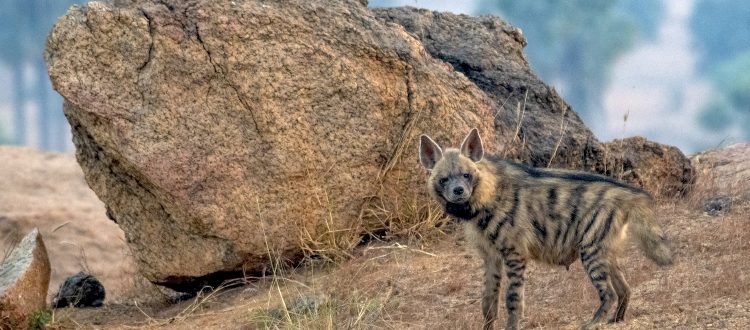Stripes of hope: securing the future of Purulia’s hyenas
Amidst the scrublands of Purulia, West Bengal, thrives a lesser-known carnivore – the striped hyena (Hyaena hyaena). Often shrouded in myth and misconception, these fascinating animals are vital in maintaining the ecosystem’s health. They fulfil a crucial ecological role as scavengers, aiding in the natural recycling of nutrients and maintaining a balance within the ecosystem. However, factors such as habitat loss, human-wildlife conflict, poaching, and illegal wildlife trade have led to a steep decline in their population across their range, including Purulia in West Bengal. The species is categorised as ‘Near Threatened’ in the IUCN Red List and listed under Schedule III of the Wildlife (Protection) Act, 1972.

Hyenas are often vilified in folklore and culture | Photo by Sarbajit Nandy
Recognising this urgency, the Wildlife Trust of India (WTI) extended support to Debayan Gayen, our Rapid Action Project (RAP) proponent who is collaborating with the West Bengal Forest Department (WBFD) to secure the future of striped hyenas in Purulia. Unfortunately, due to their scavenging habits, hyenas are often blamed for livestock depredation. This perception fuels conflict with local communities, jeopardising their survival.
Systematic surveys and assessments aim to assess the threat level and understand public perceptions. In Purulia, Debayan Gayen is working closely with local communities to raise awareness about the importance of co-existing with wildlife and the significance of conserving the striped hyena. Through education programs, workshops, and outreach initiatives, they aim to foster a sense of ownership and stewardship among the residents, encouraging sustainable practices that minimise conflicts and promote harmonious interactions between humans and wildlife. Furthermore, the project emphasises the importance of scientific research in formulating conservation strategies.

Camera trap being set up to gain valuable insights into the dynamics of hyena populations | Photo by Debayan Gayen
The team is conducting field studies to gather crucial data on hyena populations, their behaviours and threats in the landscape. Debayan, an independent researcher, is leading the project with his team members by employing advanced techniques such as camera traps in the field to gain valuable insights into the dynamics of hyena populations, which inform evidence-based conservation interventions. “The survival of the striped hyena is threatened by habitat degradation, roadkill and retaliatory killings, though these are rare. The expansion of human settlements, the consequent shrinkage of their natural habitat along with a scarcity of carrion have forced these scavengers into a struggle for space and food. Conservation efforts like awareness drives, forming informant networks and understanding their habitat needs are underway. We are also hoping to have a multi-stakeholder engagement for devising effective conservation strategies to save these elusive creatures. Time is of the essence to preserve the ecological balance and ensure that hyenas continue to roam the wilderness of Purulia” stated Mr. Gayen.

Awareness and capacity building workshops being held to help mitigate conflict | Photo by Debayan Gayen
Capacity building has become an integral component of any human-wildlife conflict mitigation project nowadays. Therefore, the project also focuses on collaborating with local stakeholders, including villagers, Gram Panchayats and researchers to enhance their knowledge and skills in wildlife monitoring, conflict resolution, law enforcement, and community outreach. A workshop was recently organised by the Department of Conservation Biology, Durgapur Govt. College to raise awareness in terms of the ecological importance of hyenas among young researchers and college students. Dr. Tapajit Bhattacharya from Durgapur Govt. College expressed that “the distribution of the striped hyena in the state is restricted mostly to the western districts like Purulia, Bankura, Jhargram, Paschim Bardhaman and Paschim Medinipur. There has been limited focus on this species, making the RAP project a one-of-its-kind in this region. Moreover, the field team conducted research on the social perspectives of the local people towards hyenas, and documented various threats during this period, which in turn will provide important insights for formulating long-term conservation plans.”
The Striped Hyena Conservation Project in Purulia stands as a testament to the dedicated collaboration with governmental agencies, educational institutions, and local communities. By leveraging collective expertise and resources, the project aims to protect this threatened species. By unravelling the mystery of these fascinating creatures, fostering co-existence, and promoting scientific understanding, we hope for a future where hyenas can thrive in the wilderness of Purulia. This project serves as a model for hyena conservation across India, demonstrating that dedication, collaboration, and education can safeguard even the most misunderstood creature for generations.









